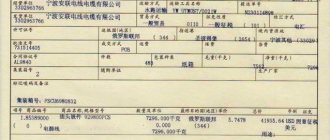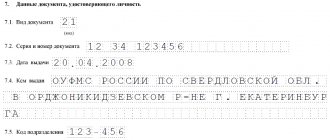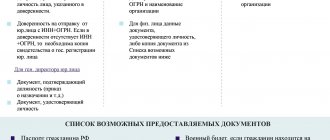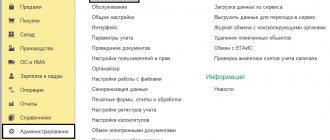When sending or processing documents, you need to correctly transmit information about the type of document, stage and action on it, attachment and event to VLSI. The article contains examples of data formatting for transmission via the EDI API.
- List of document types
- List of stages and actions (commands)
- List of document attachment types
- List of valid event names
- List of acceptable directions for packages with documents
- List of acceptable investment directions
List of document types
| Document type | Description | Direction |
| Certificate of Release | Certificate of Release | Interior |
| ActInv | Inventory | Interior |
| ActSverIsch | Act of reconciliation | Outgoing |
| ActSverVkh | Incoming | |
| Write-off act | Write-off | Interior |
| IntPrm | Internal movement | Interior |
| AgreementEx. | Agreement | Outgoing |
| AgreementIn | Incoming | |
| AgreementDoc | Agreement | Incoming |
| Outgoing | ||
| DocOtgrIx | Expense (Sales) | Outgoing |
| DocOtgrVx | Arrival (Admission) | Incoming |
| OrderRef | Order | Outgoing |
| OrderIn | Incoming | |
| CashDay | Cash book | Interior |
| CorrIsh | Letter | Outgoing |
| CorrIn | Incoming | |
| Re-grading | Re-grading | Interior |
| ReceiptOrder | Receipt cash order | Interior |
| Withdrawal slip | Account cash warrant | Interior |
| AccountEx | Check | Outgoing |
| AccountIn | Incoming | |
| InvoiceRef | Invoice dated 04/01/2016 or 02/02/2019 | Outgoing |
| FakturaIn | Incoming | |
| DeliveryTask | Waybill | Outgoing |
| Incoming | ||
| CorrIn | Adjustment | Incoming |
| CorrOut | Outgoing | |
| PriceMatchingIn | Price negotiation | Incoming |
| PriceMatchingOut | Request for prices | Outgoing |
| ReturnIn | Return from buyer | Incoming |
| ReturnOut | Return to supplier | Outgoing |
Outgoing invoices (“VakturaIsh”), invoices (“DokOtgrIsh”), certificates of completed work (“ActVR”) must be sent as a “Shipment Document”.
List of stages and actions (commands)
| Document type | Stage | Action (command) |
| ActSverIsh (Acts of reconciliation) | Dispatch | Send |
| Notice of receipt confirmation of date of receipt | Process service | |
| Notice of receipt of acceptance notice | ||
| Notification of receipt of notification of clarification | ||
| ActSverVkh (Acts of reconciliation) | Check | Approved |
| Send your option | ||
| Reassign | ||
| Notice of receipt | Process service | |
| ContractEx (Contracts) | Dispatch | Send |
| Notice of receipt confirmation of date of receipt | Process service | |
| Notice of receipt of acceptance notice | ||
| Notification of receipt of notification of clarification | ||
| ContractVx (Contracts) | Statement | Approve |
| Reject | ||
| Reassign | ||
| Notice of receipt | Process service | |
| DokOtgrIsh (Invoices, invoices, acts) | Dispatch | Send |
| DokOtgrVkh (Invoices, invoices, acts) | Statement | Approve |
| Reject | ||
| Reassign | ||
| Notice of receipt | Process service | |
| OrderEx (Orders to suppliers) | Dispatch | Send |
| OrderIn (Orders to suppliers) | Statement | Approve |
| Reject | ||
| Reassign | ||
| Send an offer | ||
| KorrIsh (Correspondence) | Dispatch | Send |
| Notice of receipt confirmation of date of receipt | Process service | |
| KorrVkh (Correspondence) | Notice of receipt | Process service |
| AccountEx (Accounts) | Dispatch | Send |
| Notice of receipt confirmation of date of receipt | Process service | |
| Notice of receipt of acceptance notice | ||
| Notification of receipt of notification of clarification | ||
| AccountIn (Accounts) | Statement | Approve |
| Reject | ||
| Reassign | ||
| Notice of receipt | Process service | |
| Notice of receipt of confirmation of dispatch date | ||
| Notice of receipt of confirmation of the date of receipt of the notice of receipt of documents | ||
| InvoiceEx (Invoices) | Dispatch | Send |
| FakturaIn (Fakturs) | Statement | Approve |
| Reject | ||
| Notice of receipt | Process service | |
| DeliveryTask (ETrN) | For execution | Transfer the cargo |
| Cargo transfer | Cargo transferred | |
| Submitted with comments* | ||
| Cancel delivery* | ||
| Reassign | ||
| Receiving cargo | Cargo accepted | |
| Accepted with comments* | ||
| Not accepted* | ||
| Reassign | ||
| Acceptance of cargo | Cargo accepted | |
| Accepted with comments* | ||
| Undelivered* | ||
| Reassign | ||
| Delivery of cargo | The cargo has been delivered | |
| Delivered with comments* | ||
| Reassign | ||
| Completion of delivery | The cargo has been delivered | |
| Delivered with comments* | ||
| Reassign | ||
| CorrIn (Adjustment) | Statement | Approve |
| Reject | ||
| Reassign | ||
| Notice of receipt | Process service | |
| CorrOut _ | Dispatch | Send |
| PriceMatchingIn _ | Send a request | Send |
| Reject | ||
| PriceMatchingOut _ | Dispatch | Send |
| ReturnIn (Return from buyer) | Statement | Approved |
| Rejected | ||
| ReturnOut _ | Dispatch | Send |
* - to execute the command you need to fill in the “Comment” field.
Cancellation steps and actions are available for all types of external document flow, except for the electronic waybill.
| Document type | Stage | Action |
| Any (external document flow) | Cancellation (dispatch, hidden stage) | Canceled |
| Cancellation | Document canceled | |
| Cancellation rejected |
Central electronic customs. What is this? How does it work?
The creation of electronic declaration centers (EDC) in Russia began with the Decision of the Board of the Federal Customs Service of the Russian Federation dated May 29, 2018. Over the course of 3 years, 36 EDCs were formed from Kaliningrad to Vladivostok on a regional and sectoral basis. But in accordance with the order of the Federal Customs Service of Russia dated February 7, 2021 No. 145 “On the creation of the Central Electronic Customs,” the first Central Electronic Customs (CElT) will appear on the basis of the Central Customs Administration; the Moscow Central Electronic Customs Office, as well as some industry-specific Central Electronic Customs Offices in the capital, will be subordinate to it. At the same time, customs posts of actual control will remain outside the jurisdiction of CELT. By the end of 2021, by analogy with Moscow, CELTs will be formed in the regions. In addition to processing documents, regional CELTs will manage subordinate customs CEDCs.
What will change?
According to experts, such decisions are related to the desire of the FCS leadership to speed up customs procedures, minimize the need to transport uncleared goods deep into the country and make the work of customs more transparent. But in fact, how the new speed of reviewing and approving documents will be achieved remains a mystery even to the department’s employees themselves. Today, one thing is clear: foreign trade participants need to prepare for the next stage of confusion and risks at each stage of export-import operations. Let's take a closer look at them.
Risk of lack of trained CELT employees
Optimistic forecasts of the leadership of the Federal Customs Service may not be realized due to the inability to staff the newly created structural units. If in Moscow and the Central Federal District there is hope that there will be enough graduates of specialized universities and a personnel reserve for the Center to begin functioning on time, then in the Far Eastern or Siberian Federal Districts the situation with personnel is more pessimistic.
Delays in processing documents
The experience of introducing innovations shows that at the first stage any work is completed more slowly; a similar effect should be expected from the launch of TsELT. Although the bulk of the declaration will be drawn up in functioning EDCs, there is a high risk that after the appearance of the control superstructure, adjustments to business processes will begin, this will lead to the need to retrain local personnel, and, consequently, revise existing work methods. The slowdown will be felt especially acutely by businessmen working in large cities or filing declarations at industry-specific CEDs.
Technical and automation problems
Since information from the EDCs will be accumulated and processed in the newly created EDTs, there is a high probability of technical failures in the operation of the equipment. Therefore, participants in foreign trade activities need to be prepared for a temporary transition to manual processing of documents, although it is quite difficult to imagine how this can be done.
Again, based on experience, at first, software and hardware work unstable and with errors - it would not be superfluous to re-check the entered data.
Customs will be ready
According to the management of the Moscow CELT, at the moment, two virtual servers with information systems of the test customs post of the electronic declaration center and the test customs post of actual control have been deployed in the Management Data Processing Center. Officials of the Moscow CED, hired for the first time, are trained on the “Electronic Declaration Center” simulator - this will ensure rapid adaptation of personnel to work in real conditions and will help minimize errors.
Similar virtual simulators are planned to be placed in regional CELTs to train local personnel. As a result, make working with entrepreneurs as comfortable and safe as possible.
Note to entrepreneurs
Based on the above, foreign trade participants need to take into account potential risks and include additional time in the contract terms for customs clearance of goods. This will protect entrepreneurs from the risk of failure to meet delivery or payment deadlines due to late dispatch or arrival of goods.
It is also necessary to be more attentive to the correctness of paperwork, because a transaction completed today on a document with errors may later, in the case of a pedantic check, lead to fines and additional charges of customs duties.
One thing is clear! That the potential difficulties described will be temporary, and as a result, the work of the Federal Customs Service will become even more business-oriented.
Transport company
Logistics
Cargo delivery
Customs
Electronic customs.
List of document attachment types
Possible values for the “Document.Attachment.Type” field.
Primary investments
| Attachment type | Description |
| ActVR | Certificate of completion |
| ActOrder | Act (customer title) |
| ActPP | Act of acceptance and transfer of non-exclusive rights |
| Acceptance Certificate | Certificate of acceptance of goods |
| AktSver | Reconciliation Act |
| Agreement | Agreement |
| Order | Order |
| RequestPrice | Document for price approval |
| KnuckleBuy | Bill of lading (buyer's title) |
| LetterEDO | EDI correspondence |
| Confirmation of an order | Confirmation of an order |
| ReceiptOrder | Receipt cash order |
| Withdrawal slip | Account cash warrant |
| ServiceZap | Document type for "Task" |
| schFaktKor | Adjustment invoice |
| SchFktr | Invoice dated 04/01/2016 or 02/02/2019 |
| NotifyOtgr | Shipping Notice |
| UkdDis | Adjustment document |
| UkdDisPurchase | Adjustment document (buyer's title) |
| UkdKschfDis | Adjustment invoice and adjustment document |
| UkdKschfDisPurchase | Adjustment Invoice and Adjustment Document (Buyer's Title) |
| UpdDop | Transfer document dated 04/01/2016 or 02/02/2019 |
| UpdAddPurchase | Transfer document (buyer's title) |
| UpdSchfAdd | Invoice and transfer document dated 04/01/2016 or 02/02/2019 |
| UpdSchfAddPurchase | Invoice and transfer document (buyer's title) |
| EDONakl | Packing list |
| EDOSch | Check |
| Certificate of Release | Release certificate |
| Write-off act | Write-off act |
Service attachments
| Attachment type | Description |
| IzvPoluch | Notice of receipt |
| ConfirmDateSent | Confirmation of dispatch date by the operator |
| ConfirmDatGender | Confirmation of date of receipt by operator |
| NotifiedReception | Notice of acceptance |
| NotifyUtoch | Notice of request for clarification |
Correspondence
| Attachment type | Description |
| Letter | EDO letter |
All attachment field values are case sensitive. This means that for VLSI “ SchFktr
" and "
SCHFKTR
" will be different types of investments.
Requirements for documents in electronic form
Requirements for documents in electronic form are divided into three categories and are followed in order of priority:
- General requirements. They do not differ from the requirements for paper documents and mainly relate to form and content.
- Requirements for a specific type of documents in electronic form, including electronic documents. Key in this category are the requirements for electronic signatures. It is this and compliance with the conditions for its application that make the document legally significant.
- Special requirements for specific documents in electronic form, based on their purpose, conditions of creation, processing, transmission and storage. These requirements are always individual in relation to categories or types of documents. They are reflected in special regulations or instructions.
Each document in electronic form has its own requirements. Therefore, when you are about to create or transmit a document, refer to the requirements specified specifically for it.
List of allowed events
EDI
- "Dispatching"
- "Confirmation of dispatch date"
- “Notice of receipt of Confirmation of dispatch date”
- "Confirmation of date of receipt"
- “Notice of receipt of Confirmation of date of receipt”
- "Receipt"
- "Notice of receipt"
- “Confirmation of the date of receipt of notification of receipt of documents”
- “Notice of receipt of confirmation of the date of receipt of notice of receipt of documents”
- "Notification of acceptance"
- “Notice of receipt of the Notice of Acceptance”
- "Notice of clarification"
- “Notice of receipt of Notification of Clarification”
- "Error". May appear when downloading or sending a document. The event contains a description of the problem and associated attachments that were downloaded when the error occurred. This event can be ignored
- "Cancellation"
- "Submitting a Cancellation Agreement"
- "Obtaining a Cancellation Agreement"
- “Sending confirmation of cancellation agreement”
- “Receiving Confirmation of the Cancellation Agreement”
- "Submitting a Cancellation Agreement Rejection"
- "Receiving a Cancellation Agreement Rejection"
- "Loading"
- "Deletion notice on the recipient's side"
- "Deletion notification on the sender's side"
- “Confirmation to sender for shipment”
- “Confirmation to the recipient for sending”
- “Confirmation to sender for notification”
- “Confirmation to the recipient of the notification”
- “Confirmation to sender for rejection”
- “Confirmation to recipient for rejection”
Exchange with government systems
The order in which the main events are generated is shown in the invoice exchange diagram in the API and SDK.
The list of valid event names can be expanded. We recommend ignoring events that are not listed.
The legislative framework
The use of EDI technologies is regulated by a number of laws:
- 63-FZ dated 04/06/2011. Equates electronic documents with a qualified electronic signature (CES) to paper documents with a signature and seal, which are supplied manually.
- 149-FZ dated July 27, 2006. Puts on a par the exchange of documents and electronic messages if they are certified by the CEP.
- 402-FZ dated December 6, 2011. Allows you to draw up and sign primary accounting documents in electronic form.
- Article 169 part 2 of the Tax Code of the Russian Federation. Allows you to create and sign invoices electronically.
- Article 160 clause 2 and 434 clause 2 of the Civil Code of the Russian Federation. Allows signing and execution of documents electronically.
Document formats are regulated in EDI by orders of the Federal Tax Service. Electronic document management itself is becoming mandatory for companies. This applies to labeling and traceability of goods, as well as electronic reporting and EDI in government procurement.









